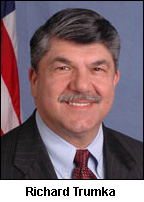OPINION
No high-tech worker shortage, firms just want lower wages
 By RICHARD TRUMKA
By RICHARD TRUMKA
(May 30, 2013) — Policy proposals from multinational corporations often come with slick, poll-tested rhetoric. It is always worth digging deeper.
And the more you dig into the idea that we need to hugely expand the number of employer-based temporary worker visas for tech companies, the more you uncover the truth: This is about powerful companies pursuing lower wages.
First, let’s be clear. Immigration helps America. People who come here to pursue their dreams and aspire to be citizens strengthen our country. America’s unions embrace immigrants and new citizens.
But we need the right rules and policies in place to reach our potential. When foreign temporary workers get stuck in a revolving-door system that does not give them a realistic chance to stay and become citizens, then the ladder to the middle class is broken. And this is definitely reason for concern.
We worry about corporations firing or passing over qualified American workers in order to import temporary foreign workers at lower wages.
We worry about a declining middle class as corporate profits reach record highs.
Americans aren’t looking for handouts. We aren’t looking to be hired for jobs for which we lack essential qualifications. We just want a fair chance to use the skills we have earned — often at the cost of huge student loans — to work our way into the middle-class jobs of the future.
High-tech companies say there are “too few” American high-tech workers, but that’s not true.
Today there are 20,000 fewer African-American computer programmers and system analysts employed than in 2008.
In the fields of computer and information science and engineering, U.S. colleges graduate 50% more students than there are new hires.
Basic supply and demand suggests that if there were too few qualified tech workers, their average salaries would be going up. But tech wages haven’t risen since Bill Clinton was president.
Clearly, high tech is not looking to bring in H-1B visa holders for a few years at a time because there is a shortage of tech workers. They want a massive expansion of H-1B visa holders because they can pay them less.
This is not about innovation and job creation. It is about dollars and cents.
Richard Trumka is president of the 12 million-member AFL-CIO.





